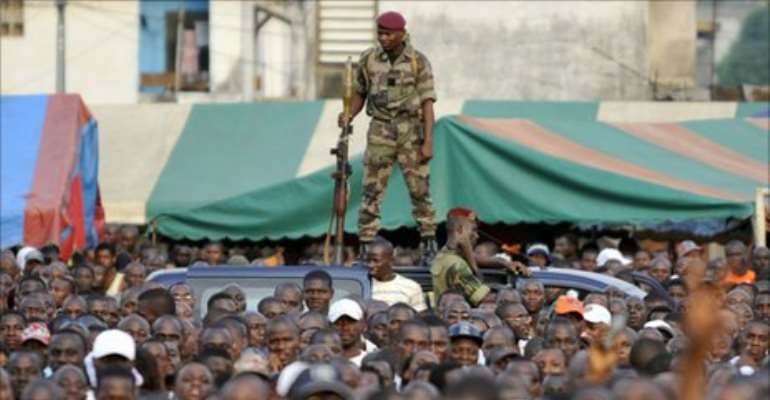Laurent Gbagbo rejects Ivory Coast resignation deadline

Ivory Coast's incumbent President Laurent Gbagbo has rejected a deadline set by his rival for him to stand down, saying the international community is trying to stage a coup against him.
Alassane Ouattara is widely recognised as the victor in elections last month.
His supporters said Mr Gbagbo would have "no difficulties" if he resigned before 0000 GMT on Friday.
But Mr Gbagbo said the country could face greater violence if he were to leave office.
In an address for the new year, Mr Gbagbo said the pressure for him to quit amounted to "an attempted coup d'etat carried out under the banner of the international community".
'Military intervention'
The UN says some 200 people have been killed or have disappeared in the past month - mostly supporters of Mr Ouattara.
It says it has received reports of at least two mass graves and has been repeatedly blocked from investigating one of them, on the outskirts of Abidjan. The other reported site lies in the centre of the country.
The Gbagbo government has repeatedly denied the existence of any mass graves.
UN human rights chief Navi Pillay has written to Mr Gbagbo to tell him he could be held criminally accountable for abuses.
Some of Ivory Coast's neighbours have threatened to oust Mr Gbagbo by force.
But analysts say intervention in Ivory Coast would be far more difficult than West Africa's previous operations in Liberia and Sierra Leone.
The UK has said it would back military intervention, if sanctioned by the UN.
Mr Ouattara is holed up in a hotel in the main city, Abidjan, protected by UN peacekeepers.
Some of Mr Gbagbo's allies have threatened to storm the hotel - a threat which UN chief Ban Ki-moon has said could spark renewed civil war.
Mr Ouattara's prime minister, Guillaume Soro, said Ivory Coast was "already in a civil war situation".
The election on 28 November was intended to reunify the country which has been divided since a 2002 conflict.
France accused
Mr Ouattara was initially proclaimed the winner by Ivory Coast's election commission, but the Constitutional Council said Mr Gbagbo had won.
Both men have been sworn in as president.
But Mr Gbagbo told Euronews that his departure would not necessarily end the unrest.
"If I said I would leave office right now, who could provide an assurance that it would bring peace and that it would not bring even greater violence?" he said.
However, he said his resignation was not on the agenda "for now".
Mr Gbagbo also told Euronews he would be prepared to accept a recount, although he did not give any details of his proposals.
"We are negotiating. I ask myself why those who claim to have beaten me oppose a recount of the votes," he said.
The UN helped organise the poll and says Mr Ouattara won.
Analysts say it would be unlikely to agree to a recount.
As international pressure increases on Mr Gbagbo to step down, the EU has agreed to widen a travel ban to 59 Gbagbo allies, diplomats say.
Mr Gbagbo accuses France, which retains considerable economic interests in its former colony, of mobilising international opinion against him.
"Amongst today's great global powers, each has its own sphere of influence. When it's something to do with Francophone Sub-Saharan Africa, France speaks and the rest follow," Mr Gbagbo said.
He has ordered the 9,500 UN peacekeepers to leave Ivory Coast and there have been some attacks on them by Mr Gbagbo's supporters.
